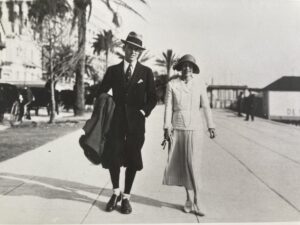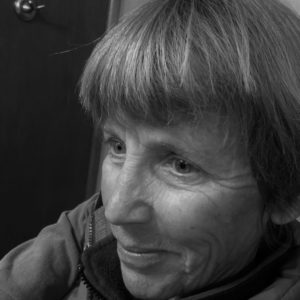My grandfather was a slender man with a high forehead and immaculate hands. He was a fly fisherman, and the reason we didn’t see him often was because he fished all over the world instead of staying home in Connecticut with his family. My father was his son. My father wasn’t a slender man; he was of normal bulk and had a full head of hair. His hands weren’t especially this way or that. As he aged they became arthritic, as did his shoulders, hips and knees. The story of my grandfather is a story with a hole in it. I hardly knew him, and I believe my father didn’t know him well either, though he spoke of him as if he were a solid man and then a solid memory, when in fact I have evidence that he was more of a wish. It doesn’t matter who someone really is; what matters is who we think they are, and this is often if not always the result of who we wish them to be.
Grandpa was a very good fisherman, this we know. I see him in Iceland and Scotland, among the thermal lakes and heather. I see him in his waders, mid-thigh in glacial streams the color of chalk, casting out and reeling in, everything in his body chanting salmon. I see him on the heath, creel overflowing with brook trout, woolen knickers and a jaunty cap, a light persistent rain falling and a fine mist rising up from the strath. He is caught between two events of dampness, of water rising and falling. He swims on through my imagination, like a brookie himself.
He married my grandmother Katherine Kent in 1921. I have a black-and-white photograph of them strolling the boardwalk in a small Florida town—perhaps Palm Beach, no longer small. The ocean in the distance, palm trees, food vendors. Grandpa in his knickers and Katherine in a sheath dress, large-brimmed hat. It was taken on their honeymoon. A few years after that, my father was born, and shortly after that they divorced. The divorce was amicable, we were told, and proof of it might be that my father’s brother Bill was conceived after the divorce was finalized. Unlike my father, Uncle Billy was a wild card. He raced cars, and married and divorced three times before he settled on a wife young enough to be his daughter. He was an actor, singer and musician. He was always out of money and instead of calling on his father, he came right to my father at those times. Grandpa would have turned his pockets inside out and said, “Sorry. The cupboard is bare.”
A story with a hole in it is still a story. In fact, most stories have their hole, and many arise out of the hole. An absence of information gives us a reason to create fictions. The fiction I create around my grandfather is almost complete because I knew him so little. In my memory, we met fewer than a dozen times, always at Yale football games in New Haven. Memories of Grandpa all have something to do with autumn and cold knees and kilts. When I think about my grandfather, the air around my body feels crisp and clear and full of the predictable rhythms of marching bands.
But I lie. There was a visit to Grandpa’s home in Connecticut, and it had nothing to do with football. The air was soft and humid and the maples fully leafed out. He tried, that visit, to teach me to cast, to fly fish on the lawn out under the trees. My line kept tangling, of course, and my hands felt big and clumsy, and the fussiness of all of it frustrated me. But it was us, together. I couldn’t say I had a glimpse inside him, unless it was the narrow view of his restless impatience. I was too young to know how to approach someone who didn’t make himself readily knowable. I blamed myself for the hole in our story, when really it was there not because of anyone or anything. It was there, and is there, because we are in this life to mend something—sometimes an old grief, an old love, often to right a wrong. The hole is the place from which the mending material has been taken, snipped out to patch an older grief or wrongdoing or love. If there’s no hole, it seems like the story is complete, but that’s not to be trusted. We have to be part fiction in order to convey our truth. We have to leave room for others to create us, and acknowledge that we are their creations.


